

4 Things Most People Get Wrong About Memory. Human memory has been shown again and again to be far from perfect.

We overlook big things, forget details, conflate events. Weight Loss Improves Memory. John Gunstad, an associate professor in Kent State University’s Department of Psychology, and a team of researchers have discovered a link between weight loss and improved memory and concentration.
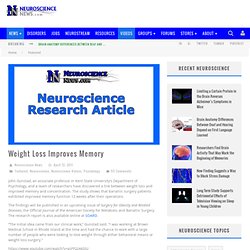
The study shows that bariatric surgery patients exhibited improved memory function 12 weeks after their operations. “The initial idea came from our clinical work,” Gunstad said. “I was working at Brown Medical School in Rhode Island at the time and had the chance to work with a large number of people who were looking to lose weight through either behavioral means or weight loss surgery.” of Gunstad discussing his research Gunstad said he kept noticing that these patients would make similar mistakes. The research team studied 150 participants (109 bariatric surgery patients and 41 obese control subjects) at Cornell Medical College and Weill Columbia University Medical Center, both in New York City, and the Neuropsychiatric Research Institute in Fargo, N.D.
10 Things That Can Influence Our Memory. Health When we experience something, there’s a variety of different factors which determine how well we’ll remember it—and how we’ll feel about it later on.

Science has tasked itself with exploring the things which make our memory tick. Here are ten ways you can manipulate this fundamental part of your mind: Sounds During Sleep Reinforce Memories Scientists have found that memories associated with sound can be reinforced by playing those sounds softly to people while they sleep. In a similar study by the same researchers, participants were asked to remember random locations of images on a screen, each of which was associated with a sound. How Friends Ruin Memory: The Social Conformity Effect. Humans are storytelling machines.
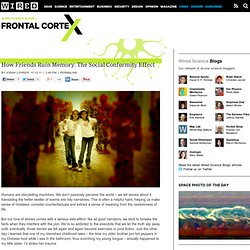
How Our Brains Make Memories. Sitting at a sidewalk café in Montreal on a sunny morning, Karim Nader recalls the day eight years earlier when two planes slammed into the twin towers of the World Trade Center.
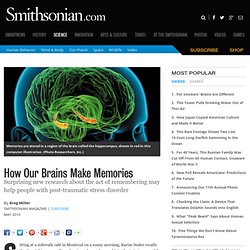
He lights a cigarette and waves his hands in the air to sketch the scene. At the time of the attack, Nader was a postdoctoral researcher at New York University. He flipped the radio on while getting ready to go to work and heard the banter of the morning disc jockeys turn panicky as they related the events unfolding in Lower Manhattan. A neural pathway that erases memories. In order to remember, we must forget.
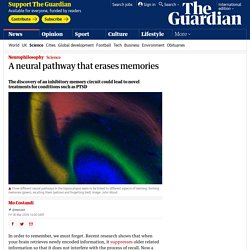
Recent research shows that when your brain retrieves newly encoded information, it suppresses older related information so that it does not interfere with the process of recall. Now a team of European researchers has identified a neural pathway that induces forgetting by actively erasing memories. The findings could eventually lead to novel treatments for conditions such as post-traumatic stress disorder (PTSD). We’ve known since the early 1950s that a brain structure called the hippocampus is critical for memory formation and retrieval, and subsequent work using modern techniques has revealed a great deal of information about the underlying cellular mechanisms. The hippocampus contains neural circuits that loop through three of its sub-regions – the dentate gyrus and the CA3 and CA1 areas – and it’s widely believed that memories form by the strengthening and weakening of synaptic connections within these circuits.
Madroñal, N., et al. (2016). Why learning is harder as we get older. Children learn.
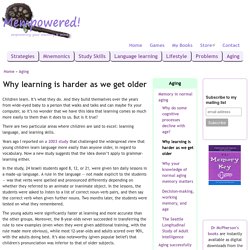
It’s what they do. And they build themselves over the years from wide-eyed baby to a person that walks and talks and can maybe fix your computer, so it’s no wonder that we have this idea that learning comes so much more easily to them than it does to us. But is it true? There are two particular areas where children are said to excel: learning language, and learning skills. Years ago I reported on a 2003 study that challenged the widespread view that young children learn language more easily than anyone older, in regard to vocabulary. In the study, 24 Israeli students aged 8, 12, or 21, were given ten daily lessons in a made-up language.
The young adults were significantly faster at learning and more accurate than the other groups. Brain Aging Linked to Sleep-Related Memory Decline. Researchers show that memories reside in specific brain cells. Our fond or fearful memories — that first kiss or a bump in the night — leave memory traces that we may conjure up in the remembrance of things past, complete with time, place and all the sensations of the experience.

Neuroscientists call these traces memory engrams. But are engrams conceptual, or are they a physical network of neurons in the brain? In a new MIT study, researchers used optogenetics to show that memories really do reside in very specific brain cells, and that simply activating a tiny fraction of brain cells can recall an entire memory — explaining, for example, how Marcel Proust could recapitulate his childhood from the aroma of a once-beloved madeleine cookie. In that famous surgery, Penfield treated epilepsy patients by scooping out parts of the brain where seizures originated. How to become a super memorizer – and what it does to your brain. To many of us, having to memorize a long list of items feels like a chore.
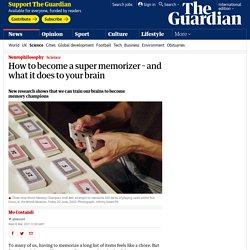
How to avoid losing your memory in the digital age. Alex Mullen has an extraordinary talent: after just 16 seconds of flicking through a pack of cards, he can recall their exact order.
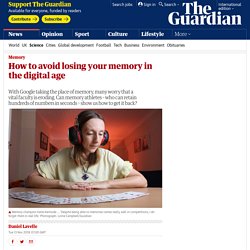
The 26-year-old medical student began using memory techniques to help with his university degree, but he picked them up so quickly that soon he was entering competitions, eventually becoming the International Association of Memory world champion in 2015. At the championships, which take place again this December, “memory athletes” compete to remember the most in the shortest time, in categories that include card sequences, names, faces and dates of historic events. 14 Old-School Ways to Remember Stuff.
How to Study Less by Learning Things Once. You read over your notes. Then you read them over again. Then you read them over a third time. Then you take the test and are surprised at just how much you missed. Despite reading everything three times! How to Remember What You Read. Improve Your Memory by Speaking Your Mind’s Language. By learning the language your mind uses, you’ll be able to tap into your mind’s full potential and develop a remarkable memory. It’s easier than you think – and you’ll actually have fun doing it.
Your Mind Thinks in Pictures Along its evolution, the brain has become amazingly effective in dealing with sensory data. It is by correctly interpreting the five senses that the mind understands the environment and takes decisions. Among the human senses, sight has become the most sophisticated and developed of all. Mnemotechnics.org: Memory Techniques Forum and Training. Why Students Forget—and What You Can Do About It. Teachers have long known that rote memorization can lead to a superficial grasp of material that is quickly forgotten. Free Working Memory Test - MemoryHealthCheck. Exercise your working memory capacity with these online screening tests: A popular working memory test that is used in many cognitive and neuroscience research labs. Type the numbers you see into the box below.
Most people are able to remember 5 to 8 numbers in a row. Users can change the “Span” of numbers displayed below. To make this test more challenging, switch from Forward to Reverse order, and change the test speed from Slow to Fast. Digit Memory Test by MyBrainTest.org. The Most Efficient Way to Practice. The old cliche has it that practice makes perfect, but what makes for perfect practice?
How Memory Works: an Infographic. Brains in Oper.ability. Brains Operating Differently. Integrat.ably. Psycho.Logic. Puzzling. Quot.ably. Learning, Memorization, Practice. Memory.
Reasoning/Theory of Knowledge.